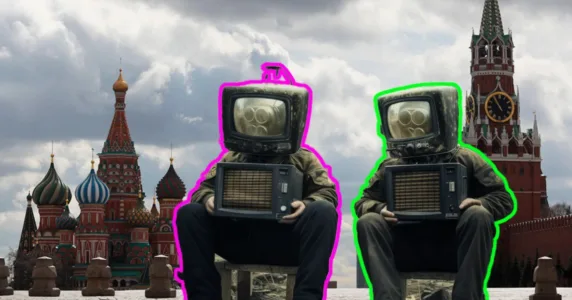Navigation and useful materials
Over the past ten years, Russia has gradually formed a sense of Europe’s total dependence on Russian energy carriers. The aggressor worked not only in the information field but also through European political systems, infiltrating them with its lobbyists. Having gained access to the uppermost echelons of power, the Russian Federation sought to influence important political decisions regarding European energy security. This is what enabled the Nord Stream 2 political project.
Ukraine paid twice too much for this deliberately created “gas dependence”: first when Russia illegally annexed Crimea and occupied the east of Ukraine, and next, during the full-scale invasion. Each time, the aggressor resorted to “gas manipulations,”, threatening Europe with a “cold winter.” This also includes Russian fables for Western countries telling how “Ukraine is an unreliable transit country.”
Unfortunately for Ukraine, it wasn’t until recently that the EU embarked on a long road to completely demonopolize the gas market and restructure the logistics of supplies. Let us explain why Europe found itself dependent on the Russian “gas needle” and what prospects it now has to “quit” it as soon as possible.
Why is Europe Partial to Russian Gas?
In recent decades, European countries, primarily Germany, have been actively discussing the discontinuation of nuclear energy use. In 2011, Germany adopted a plan to gradually phase out nuclear power ending in the shutdown of all its nuclear power plants by the end of 2029, moving on to other energy sources, one of them being cheap Russian gas.
Russia began promoting the idea of building a second large-capacity Russian gas pipeline for the European market in early 2012. The plan was for Nord Stream 2 to supply gas through the Baltic Sea directly to Germany and from there to other European countries. After its implementation, Russia was supposed to become independent of ground transit through Ukraine and Belarus.
However, the project officially started only in the fall of 2015, after the annexation of Crimea and massive artillery attacks in Donbas. Back then, Moscow claimed that the main goal of launching gas pipelines in the Baltic Sea is to put an end to the transit of Russian gas through Ukraine.
In 2021, Russia provided 40% of gas supplies to Europe. At that time, Europeans found it inexpedient to refuse Russia’s low prices for gas. Moreover, the Russian mass media were enthusiastically spreading myths of Europe’s inability to survive without their gas. That is why relations with the Russian Gazprom, which was so eager to establish a monopoly, relied on concessions.
Because of this, European leaders tended to refrain from sharp statements on the annexation of Crimea. The Ukrainian peninsula, followed by the occupied part of Donbas, became, as it were, a bargaining chip for cheap heating in European homes. That made it more and more in Russia’s interest to push the narrative that Nord Stream 2 was not a political project but an economic one. Such ideas resonated with the then German Chancellor Angela Merkel, who grew to adopt Moscow’s line of argument. More and more Western countries stopped pointing out that Russia used profits from the sale of energy carriers to finance its military aggression against Ukraine.
How Russia is Blackmailing Europeans by Cutting Gas Flows
Last year, European regulators started to defer the licensing of Nord Stream 2 due to legal inconsistencies. In response, Gazprom reduced supplies to the spot market, which sparked a fivefold surge in gas prices. At that time, Russia said that the launch of Nord Stream 2 was a fundamental case that was the only way for Europe to retain cheap gas.
As of today, gas flows through Nord Stream 1 have already been cut to 30%-40% of the former capacity.
“Russia is blackmailing us. Russia is using energy as a weapon. Therefore, in any event, whether it is a partial or a major cut-off of Russian gas, or a total cut-off of Russian gas, Europe needs to be ready,” said the President of the European Commission Ursula von der Leyen.
In this regard, the European Commission has developed a legislative instrument to reduce gas demand in Europe by 15 percent by next spring.
What will Happen if Europe Becomes Less Interested in Russian Gas?
One cannot say that Europe can refuse to purchase Russian gas in the short term. Although we do see that European countries are already looking for ways to reduce their dependence on Russian gas with minimal damage to the economy.
Firstly, it is crucial to understand that if Gazprom stops supplying gas, it will not only be Europe that will suffer but Russia itself. And the main thing here is that Russia will feel the damage and suffer from it more in the long run. The EU market currently remains the main sales market for the Russian Federation, and by cutting ties with it, Russia will lose its main source of income.
Secondly, the EU’s task in the coming years is to build LNG terminals and improve existing gas pipelines in order to replace all the fuel coming from Russia. It should be noted here that this is easier to achieve than for Gazprom to find a market for surplus gas or resort to recovery cuts. The Kremlin understands that stopping gas recovery will have a long-term negative impact on the wells. While for the EU, new LNG terminals will give wider access to the dynamic market of liquefied gas.
Thirdly, European businesses understand that Russian gas will inevitably become more expensive because of sanctions. It will make it inevitable for enterprises to look, however slowly, for alternative fuels and to take energy-saving measures.
As for Ukraine, the discontinuation of gas supplies from Russia will not significantly impact the market directly because the country does not depend on Russian gas imports.
The biggest problem to be resolved here is for Ukrainian companies to provide sufficient financing to purchase enough gas in preparation for the heating season. This will amount to 9-10 billion cubic meters of gas a year.
Besides, if Gazprom decides to unilaterally cut ties with Ukraine as a transit country and not pay for gas transit, the company will violate its five-year contractual obligations. If it happens, Russia will be obliged to pay a significant fine in the event of arbitration, which Naftogaz of Ukraine will have the right to initiate.
To sum up, the demand for Russian gas on the European market will subside before long. And this is bound to happen regardless of how painful this process will be for the European economy. After the recent events, Gazprom’s reputation as a reliable supplier has been completely ruined.
If you have found a spelling error, please, notify us by selecting that text and pressing Ctrl+Enter.



